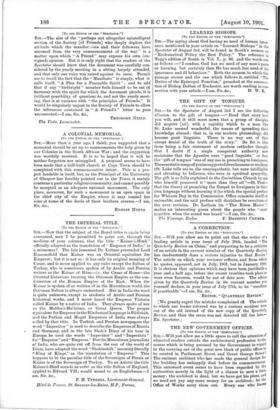THE IMPERIAL TITLE.
[To THE EDITOR OF THE "SPECTATOR.1
SIR,—Now that the subject of the Royal titles is again being canvassed, may I be permitted to point out, through the medium of your columns, that the title " Kaisar-i-Hind," officially adopted as the translation of " Emperor of India," is a misnomer? The late lamented Dr. Leitner persuaded Lord Beaconsfield that Kaisar was an (Mental equivalent for Emperor; but it is not so: it has only its original meaning of Qmsar, and is never applied to any ruler except the Sultan of Turkey, who is sometimes spoken of by Arabic and Persian writers as the Kaisar of Rum— .e.. the Ciesar of Rome—the Oriental historians treating the Ottoman Empire as the con- tinuation of the Roman Empire of the East. When the Kaisar is spoken of or written of in the Mussulman world, the Ottoman Sultan is always understood. But in India the word is quite unknown, except to students of Arabic and Persian historical works, and I never heard the Empress Victoria called Kaisar by a native of India. They always spoke of her as the Malika-i-Mu'tizima, or Great Queen. The proper equivalent for Emperor in the Hindustani language is Pidishih, and the Pathan and Mogul Emperors of India were always called by that title. In Turkish and Persian newspapers the word " Imperator " is used to describe the Emperors of Russia and Germany, and in the late Shah's Diary of his tour in Europe, he used the words " Impertitor " and " Imperatris " for " Emperor " and "Empress." But the Mussulman journalists of India, who are quite cut off from the rest of the world of Islam, have adopted the word " Shahinshih," meaning literally "King of Kings," as the translation of " Emperor." This happens to be the peculiar title of the Sovereigns of Persia as Kaisar is of the Sovereign of Turkey. To an Asiatic the title Kaisar-i-Hind sounds as outré as the title Sultan of England, applied to Edward VII., would sound to an Englishman.—I am, Sir, &c.,


































 Previous page
Previous page